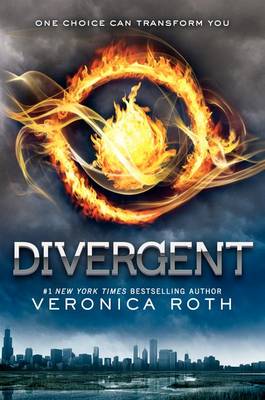Reviewed by Briana @ Pages Unbound on
Narration aside, I really loved Divergent, but I appreciated it more as a romance than a dystopia. The story is based on the premise that all people belong to one of five factions: Abnegation, Amity, Candor, Dauntless, or Erudite. This is fine, except that the majority of people seem to manifest the values of only a single Faction—and they do it unceasingly. In one of the beginning chapters, Beatrice describes a scene at her school where the students are waiting for a test. The Candor are debating, the Erudite are reading, the Abnegation are sitting silently, the Dauntless are messing about, and the Amity are playing a group hand game. This is apparently how the Faction members spend all their free time. Unfortunately, even the argument that they are conforming to social norms cannot convince me that Erudites whip out a book any time they have a free second. It seemed more stereotypical than a convincing depiction of a society forced to act a certain way.
In fact, there were really no moments where I looked at the society in Divergent and thought That’s really awful. Of course there’s an evil plot and people trying to control each other by hiding information and messing with their brains—things one would expect in a dystopian novel. But somehow I was never horrified the way I was by Uglies or The Hunger Games. In some ways, the evil plot and who was directing it was too obvious. In other ways, there was no build-up to it at all and things just suddenly started happening.
The aspects that really kept me reading were not the main plot. First, I was fascinated by life in the Dauntless compound and how Tris was going to get through her initiation. Roth clearly chose the most interesting Faction for the main setting of her book, and she exploits it well with descriptions of crazy stunts and a wild initiation—nothing like the month of community service that Abnegation initiates perform. It did take Tris a little too long to ponder the difference between being a bully and truly being brave and to notice that some things about the Dauntless have become corrupt. The real definition of courage is one of the few important questions the book stops to ask, and I would have liked for it to be more prominent. Tris finally does address it, however, and it is one of the finest moments of Divergent.
Second, I wanted to see the romance unfold. Who the main love interest will be is relatively obvious soon after he is introduced, but Roth does an amazing job of developing a relationship between him and Tris; this is not a story where the characters fall in love at first sight. They have a lot of little encounters that I was literally gushing over. It was sweet but not too gooey because they are Dauntless, after all. They have a nice balance of knowing the other person is strong but understanding that sometimes they are weak.
Roth has created a very interesting world in Divergent, and I would like to have an inside look at the other Factions. This book has some great opportunities for readers to choose Factions the way Harry Potter fans declare allegiance to a particular house. Roth’s world-building and the romance are the main reasons I will be reading the sequel Insurgent in May. Frankly, I am not overly interested in how Tris and her friends plan to save their city.
Reading updates
- Started reading
- 20 October, 2011: Finished reading
- 20 October, 2011: Reviewed
